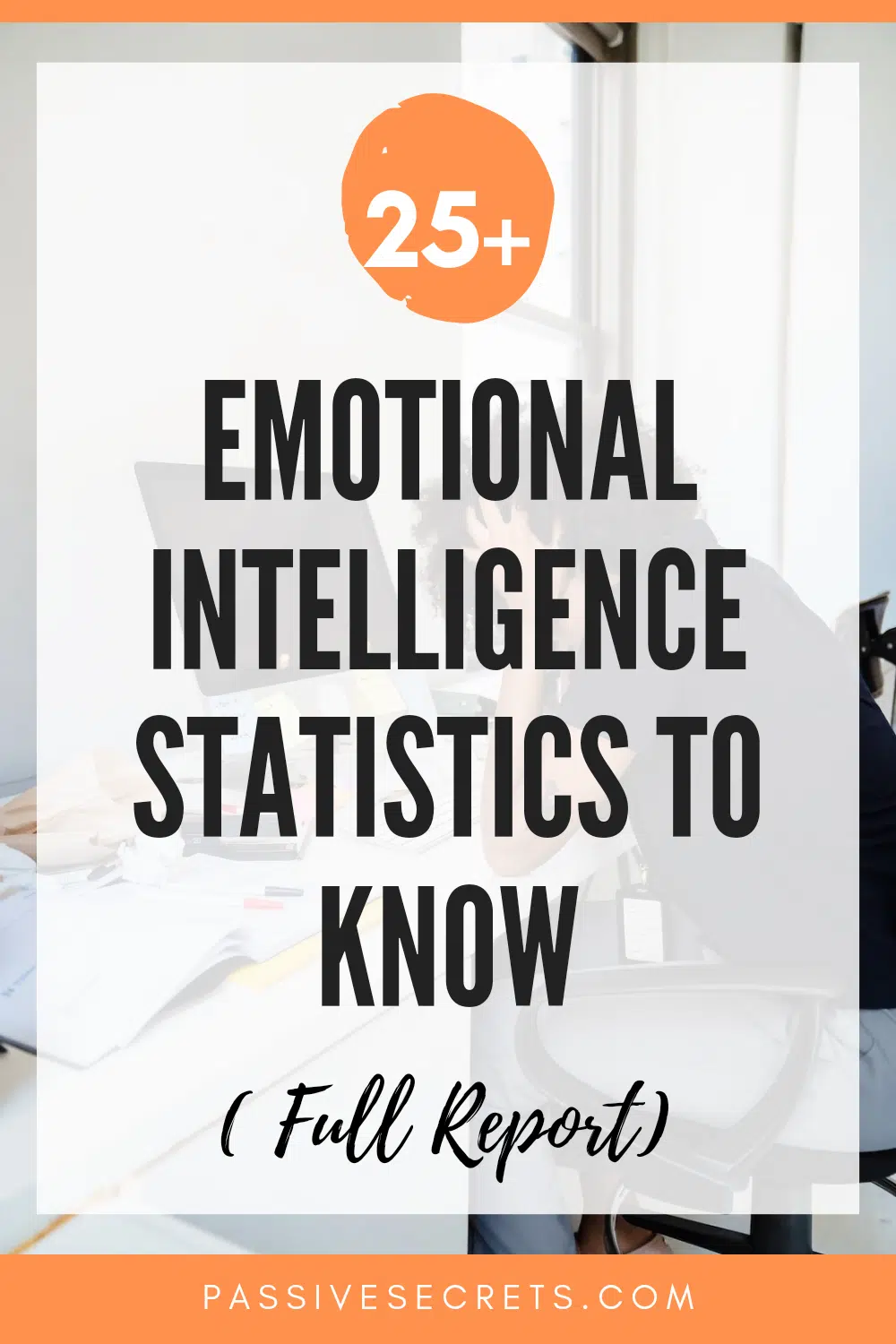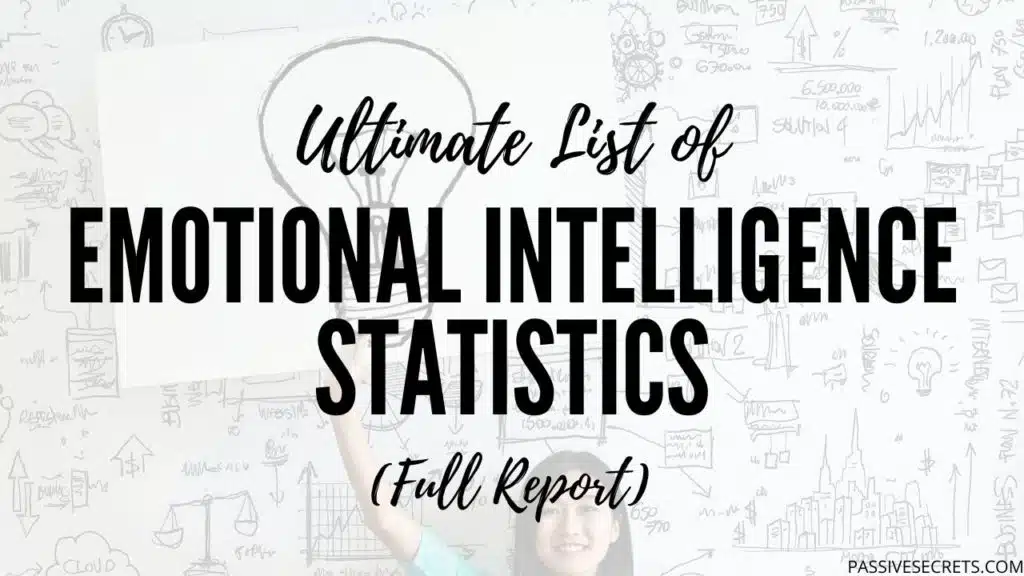
As humans, we are emotional beings. This means our actions, decisions, and reactions are based on emotions. Although it is entirely normal, it becomes wrong when we cannot control those emotions.
Hence, emotional intelligence is vital. Emotional intelligence is the ability to recognize and control your emotions.
In the corporate world, you cannot escape working with people; if you cannot control your emotions when dealing with people, you risk ruining your life and career.
Yes, it is that serious.
Unfortunately, many employees and employers in companies lack emotional intelligence, leading to severe conflict and low productivity.
In this article, I selected the latest emotional intelligence statistics that reveal the state of emotional intelligence in the workplace and society.
These statistics show how emotional intelligence can affect your performance at work and cause a promotion, demotion, or job rejection.
Key Highlights: Most Interesting Emotional Intelligence Facts
- Emotional intelligence accounts for over 60% of people’s personal and professional achievements.
- Only about 36% of people worldwide are emotionally intelligent.
- The demand for EQ skills is likely to grow by 6x in the next 3-5 years.
- The Emotional Intelligence market was valued at $868 million in 2021 and is projected to grow at a rate of 25.2% CAGR between 2022 and 2030.
- Emotional intelligence has a 58% influence on job performance, and 90% of top performers at work have high emotional intelligence (EQ).
- Up to 60% of people are emotionally detached from work.
- Employees with empathetic leaders report an increase in engagement (76%) and creativity (61%), leading to higher performance levels.
- A company that prioritizes emotional intelligence is 22x more likely to perform higher than companies that do not.
- 52% of companies offer senior management roles based on candidates’ emotional intelligence skills.
- Over 36% of business executives believe that emotional intelligence will become a compulsory skill to have in a few years.
What is Emotional Intelligence?
Emotional intelligence, also emotional quotient (EQ), refers to your ability to understand, control, use, and manage your emotions to relate well with others and overcome challenges.
A key sign of emotional intelligence is your ability to let go of mistakes and embrace and accept changes.
It also shows personal awareness of strength and feelings, empathy and sensitivity to others’ feelings and concerns, and managing emotions in challenging situations.
Emotionally intelligent people understand that emotions can be powerful and temporary.
Deciding anger doesn’t depict emotional intelligence. An emotionally intelligent person will take some time to calm their emotions before responding.
It also transcends beyond the self and moves to others. Empathy is a crucial factor, NOT sympathy.
The topic of emotional intelligence has become one of the most discussed topics, especially in the field of psychology.
This article looks at the statistics surrounding emotional intelligence and the latest strategies.
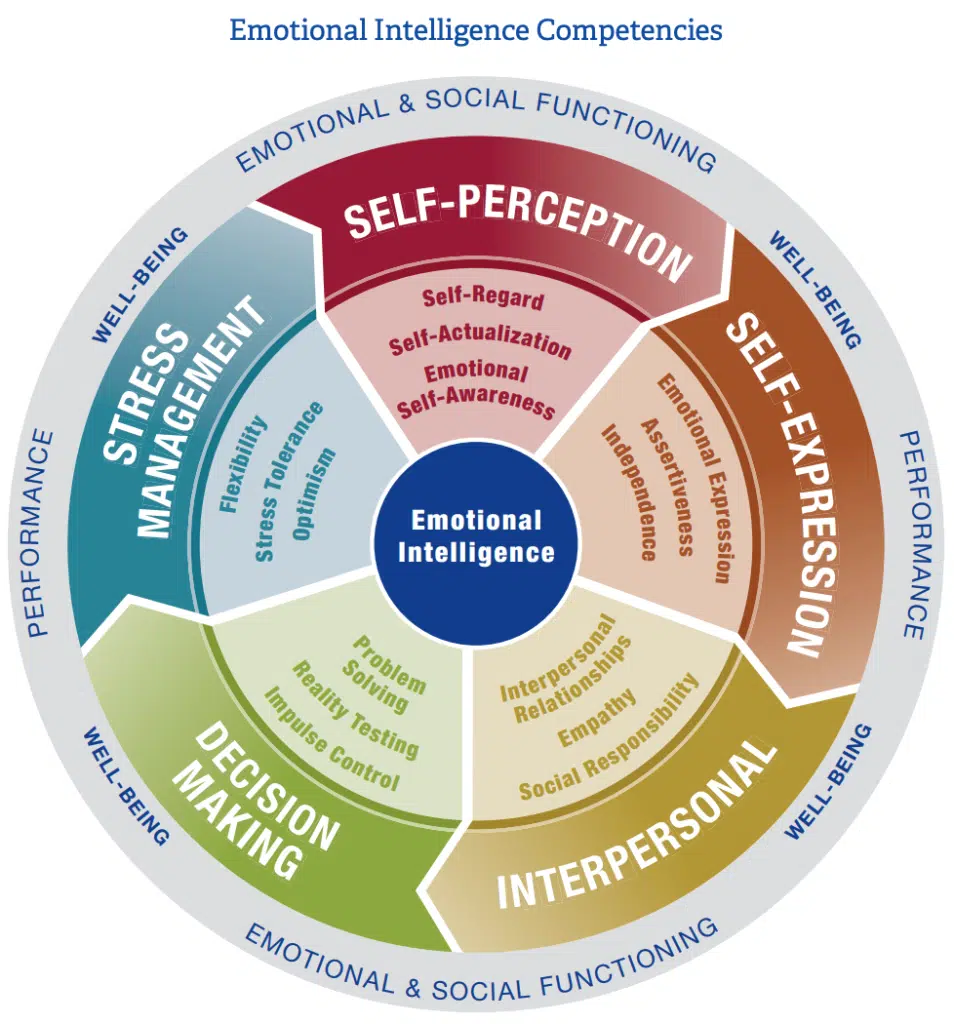
General Emotional Intelligence Statistics
1. The Emotional Intelligence market, which was valued at $868 million in 2021, is projected to grow at a rate of 25.2% CAGR between 2022 and 2030. (source)
2. Emotional intelligence has a 58% influence on job performance. Also, 90% of top performers at work have high emotional intelligence (EQ). (source)
3. The demand for EQ skills will most likely grow by 6x in the next 3-5 years. (source)
4. Only about 36% of people worldwide are emotionally intelligent. (source)
5. Employees with empathetic leaders report an increase in engagement (76%) and creativity (61%). (source)
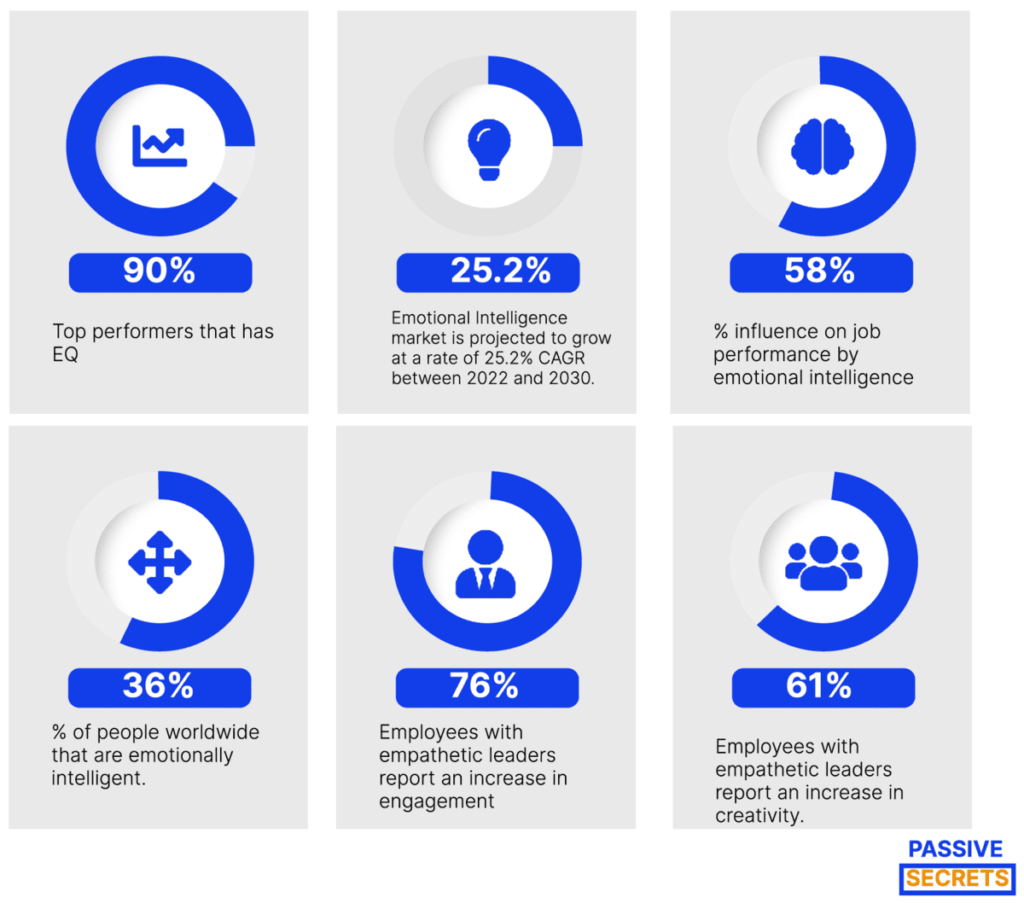
These employees have higher performance levels, engagement, and creativity than those with less empathetic leaders.
6. The Intelligent Quotient (IQ) only accounts for 20% of success. This is because social and emotional intelligence are the significant determinants of success. (source)
7. Restaurants managed by people with high emotional intelligence grow their profit by 22% yearly. (source)
8. With an average score of 76, people in the HR industry have the highest EQ score. (source)
9. Emotional intelligence accounts for over 60% of people’s personal and professional achievements. (source)
10. 95% of people think they are self-aware, but only 10–15% are. (source)
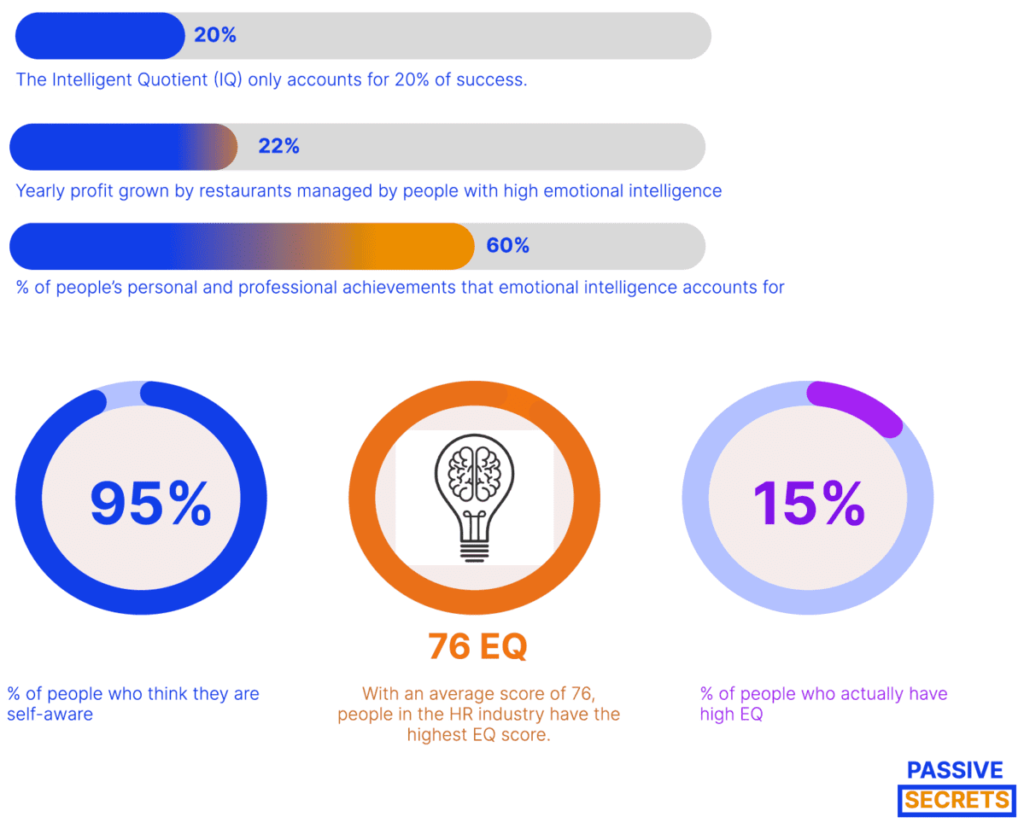
Statistics on Emotional Intelligence at Workplace
11. 75% of Fortune 500 companies use emotional intelligence training tools. (source)
12. Up to 60% of people are emotionally detached from work. (source)
13. A company that prioritizes emotional intelligence is 22x more likely to perform higher than companies that do not. (source)
14. The cost of low emotional intelligence in a company includes higher stress, low productivity, and damaged trust, among others. (source)
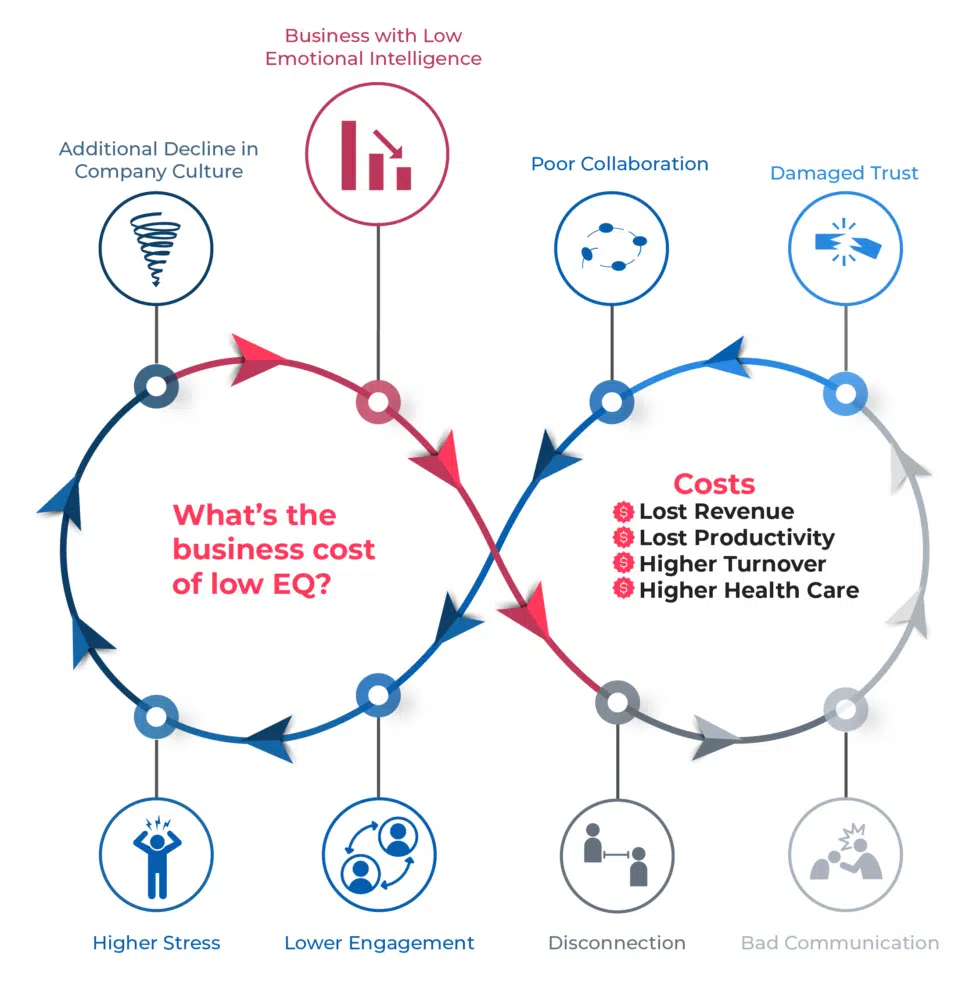
15. Emotional intelligence interventions in the workplace can reduce employee turnover by 63%. (source)
16. 52% of companies say they offer senior management roles based on candidates’ emotional intelligence skills. (source)
17. Over 36% of business executives believe that emotional intelligence will become a compulsory skill to have in a few years. (source)
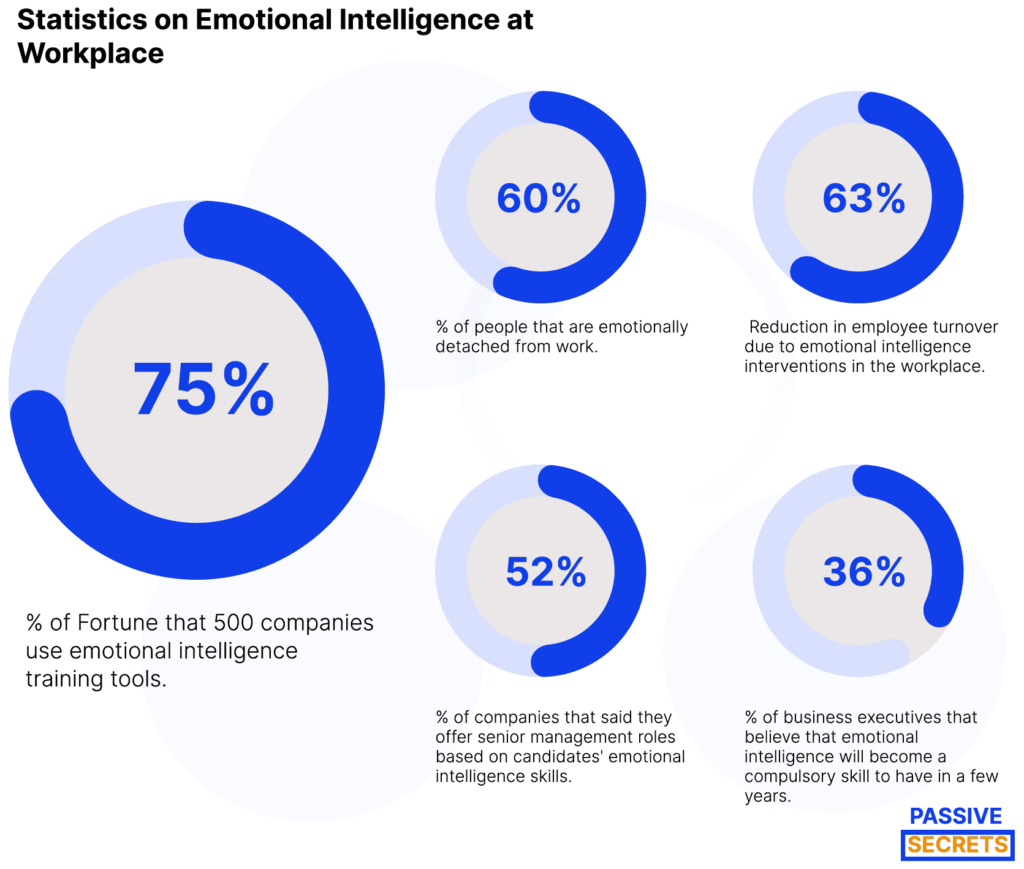
18. 75% of surveyed HR respondents say they value an employee’s EQ over IQ. (source)
19. People with high EQ make $29,000 more annually than people with low EQ. (source)
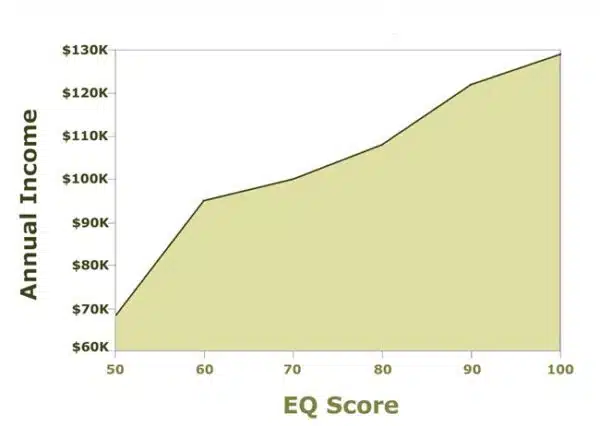
20. Over 80% to 90% of competencies that differentiate top performers from others are in the domain of Emotional Intelligence. (source)
21. 87% of Millennials today are motivated by the emotional intelligence of their leaders to help the company succeed. (source)
Additionally, 80% of employees believe emotional intelligence is vital for their career development.
22. 59% of employers will not hire someone with high IQ but low EQ. Also, 75% say they will most likely promote a high EQ employee. (source)
23. 42% of surveyed organizations worldwide say they conduct training on emotional intelligence for senior management. (source)
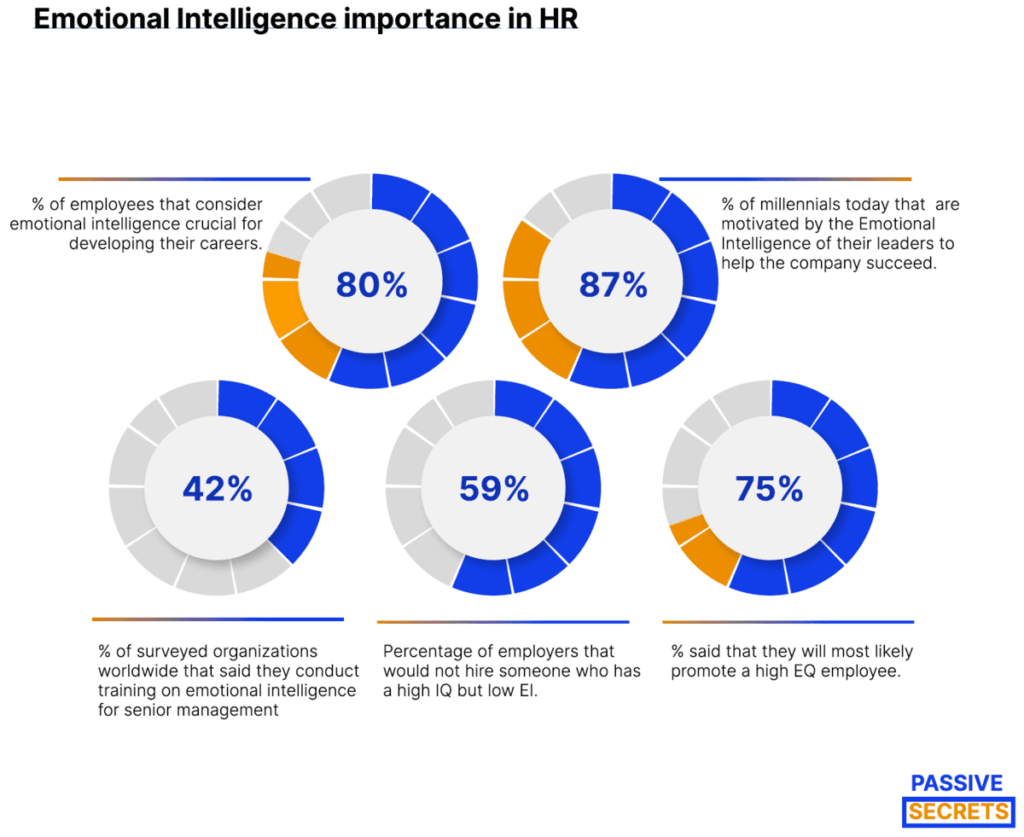
24. In a survey conducted for entrepreneurs in 2020, more than 95% stated that EQ in leadership is more important than IQ. (source)
25. Nearly 60% of the founder respondents in a survey reported that in a year shaped by the pandemic and racial justice crisis, incorporating EQ into culture is more important now than ever. (source)
Additionally, founders consider trust-building as the highest-ranking EQ skill they consider a strength.
26. Over 80% of surveyed millennials believe that coaching/classroom training is the most effective for developing emotional intelligence skills. (source)
27. Leaders with empathy perform 40% higher in coaching, decision-making, and communication than those without. (source)
28. 72% of employees say that their top factor for job satisfaction is “respectful treatment of all employees at all levels.” (source)
Emotional Intelligence Strategies
Promoting and maintaining a positive work environment is very important. In a positive work environment, the abilities of every staff thrive.
David Goleman’s book on emotional intelligence, “Why it can be more than IQ,” points out that leaders must take advantage of this skill set’s growth. EQ has been found to produce measurable results in business.
Why use EQ?
- It is an excellent way to motivate yourself and others to increase workplace productivity.
- EQ allows you to be attentive to your emotions and that of others, giving room to make positive changes.
- For leaders, training, mentoring, and evaluating team members helps.
- It aids problem-solving while fostering healthy workplace relationships.
- 90% of top performers have high EQ degrees, while 20% have high IQ degrees.
So far, you have seen why EQ can be the difference between success and failure, yet this skill will remain a mirage without the proper understanding and strategy.
Emotional intelligence is not a skill you are born with but one you develop with time and practice.
There are six key concepts in Emotional intelligence. These are:
- Empathy
- Self-awareness
- Self- Motivation
- Social skills
- Self-regulation
- Relationship management
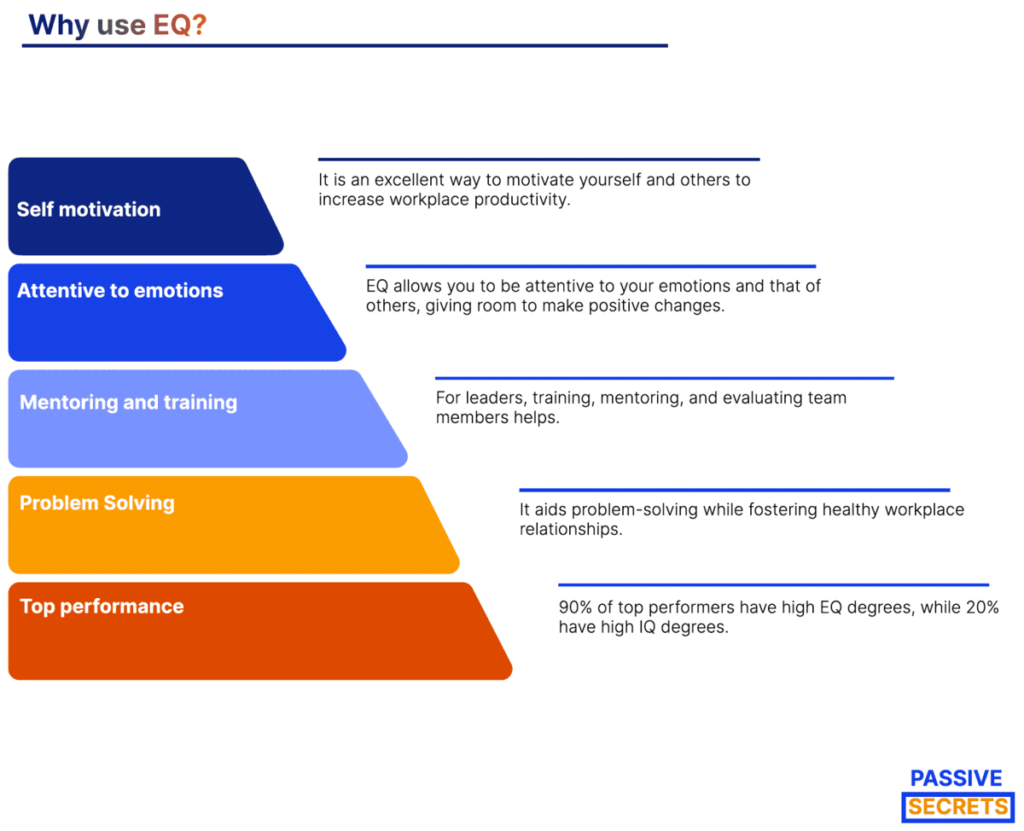
1. Empathy
Empathy is the ability to zero in on the emotions and feelings of another person and use these findings to communicate or relate with them.
Empathy seeks to understand why people act the way they do. It aims to understand the motives behind the actions.
Exercising your compassion skills can help you handle difficult people and situations.
It also helps you understand your emotions, how they affect others, and your relationship with them. Empathy is like the adage, “Put yourself in another’s shoes.”
How to Practice Empathy in the Workplace
- Imagine yourself in the shoes of the person with whom you disagree.
- Also, envision your response and feelings towards a certain issue. Learn to know why you feel the way you do and how it will impact the next person.
- Determine to place the emotional needs of others before yours.
2. Self-awareness
Emotional or self-awareness is the starting point for any individual or leader to excel in EQ.
Often, we tend to become absent-minded or robots of habit, not minding what is going on in the moment, how we feel, and what we can do to change it.
Self-awareness helps you understand the underlying and main reasons why you feel angry, frustrated, sad, etc.
Practising mindfulness is a skill that many scientists recommend to improve your productivity. It reduces the rate of making errors and gives room for creativity.
You also need to be mindful of your employees’ or employers’ relations with you and how to interact better with them.
How to Practice Self-awareness
- Evaluate each day by writing down your feelings, no matter how brief or dominant they were.
- Ask yourself why you feel the way you did when you did.
- Each week, try to determine your performance level from the ratings and opinions of close colleagues.
- When you have negative emotions, what can turn this feeling around? Pen down ways to control negative feelings or situations.
3. Self-motivation
What you consider possible in your mind begins to become viable in your life. The biggest motivation you can ever have is yourself.
How to Practice Self-motivation
- Start your week by listing your goals and how you want to feel while at it.
- Set achievable goals and targets that will leave you feeling fulfilled.
- List what you love and appreciate about your job and working environment.
- Look out for negative thoughts of criticism, pessimism, and defeat. Immediately motivate yourself by remembering your good traits and the need to push for more.
4. Social Skills
Social skills are using other strategies to foster relationships within and even outside the workplace. Due to certain misconceptions, many feel EQ is a social skill, but it isn’t.
Social skills or management are vital in knowing the emotional state of others and how to respond or react to them. You can detect how your team member or employee feels, why they feel that way and the best way to respond.
It is how you can look past your needs and feelings and pay attention to another.
How to Practice Social Skills
- During conversations, pay attention to details. This is the most straightforward way to identify the emotional state of others.
- Instead of a general approach, study the behaviour and personality of your team members or leaders to help you interact with them better.
- Use your social skills to understand and regulate your emotions during interaction with others.
- Another advantage of social skills is the ability to persuade. Practice using social skills to convince others alongside IQ or logic.
5. Self-regulation
Self-regulation is like being in the control room. You have the power and authority to control how you feel when you feel it and how to manage it.
With this skill, you can avoid certain negative emotions that, if left unchecked, could escalate to negative energy, outbursts, or depression.
You cannot control what happens to you, but you can control how you react.
Imagine verbally abusing your colleague because you had a bad weekend. That shows a lack of emotional intelligence.
Sometimes, negative emotions can be channelled into positive courses. I realize that whenever I have a poor performance at work, I always use it as a reason to motivate myself and push for more. You can turn the tides, too.
How to Practice Self-regulation
- Avoid immediate response to heated situations, especially if you feel angry or frustrated. Cool off and give it time.
- Wish for the best, but expect the worst also at your workplace. This way, you can’t be caught off guard easily.
- Relieve your stress by having coffee, sticking motivational quotes around your workspace, or any other suitable means. You can also try exercises, meditation, music, good eating habits, and patterns to uplift your mood generally.
6. Relationship Management
In the statistics above, we see that 72% of employees agreed that job satisfaction was attributed to being a result of respectful treatment in the workplace.
Relationship management is your way or method of being in control of conflicts, employees’ underperformance, and how to influence and help them reach maximum productivity.
How to Practice Relationship Management
- Resolve conflicts by listening to parties involved and being objective.
- Address issues as they come. Do not wait till it is blown out of proportion.
- Observe the performance and disposition of employees. Make sure no one is left behind in performance or social involvement. You can take a step by boosting the morale of the withdrawn or isolated ones.
- Communicate with your team and use incentive packages to boost the morale of hardworking staff.
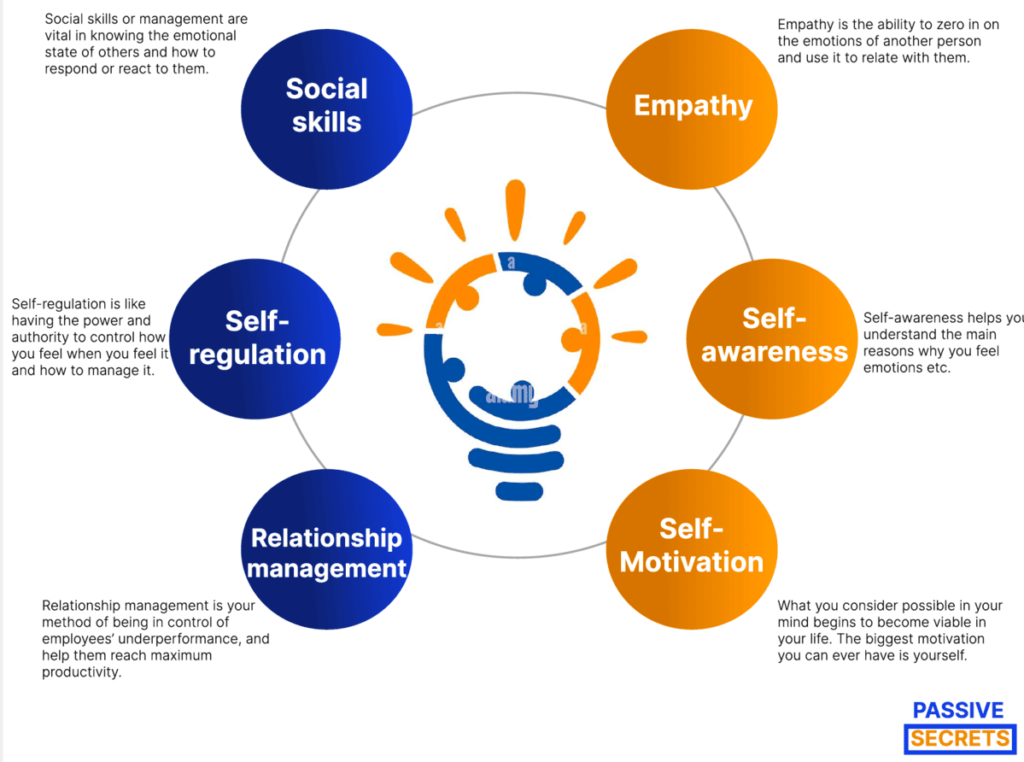
Frequently Asked Questions
1. What Percentage of Success is Emotional Intelligence?
58% of success is emotional intelligence.
2. Is EQ Better Than IQ?
Your IQ accounts for only 20% of your life, while your EQ takes the remaining 80%.
3. What are the Elements of Emotional Intelligence?
The elements of emotional intelligence include self-awareness, self-regulation, empathy, motivation, and social skills.
4. What percentage of people have emotional intelligence?
36% of people worldwide are emotionally intelligent.
5. How Do You Measure Emotional Intelligence?
There are three ways of measuring emotional intelligence: Self-reporting, other-reporting, and ability testing or ability measures.
6. What is the Downside of High EQ?
People with high EQ have lower levels of creativity and may lack innovation.
Final Thoughts
The world is ever-evolving, and so is the workplace. Smart business leaders know that success is not a coincidence or a math plan. It consists of well-laid-out plans and practices.
As a business leader, you can use these emotional marketing statistics and strategies to improve employee productivity and leader effectiveness.
Right from the recruitment stage, emotional intelligence is needed. You need employees with the same or similar values and belief systems.
You also need to work with people who wouldn’t make every day seem like a nightmare.
As an employee, you need to be relatable, self-motivated, goal-oriented and have good control over your emotions.
With good practice and possibly expertise in EQ, you become a person who can uplift others.
You also increase productivity because the good and bad times are under your control.
A lot of workplace harassment and unproductivity will be cut off if employees and employers are emotionally intelligent.
Emotional intelligence is the only way to create a safe, peaceful, and loving working environment. We are humans, after all, and our emotions are part of who we are.
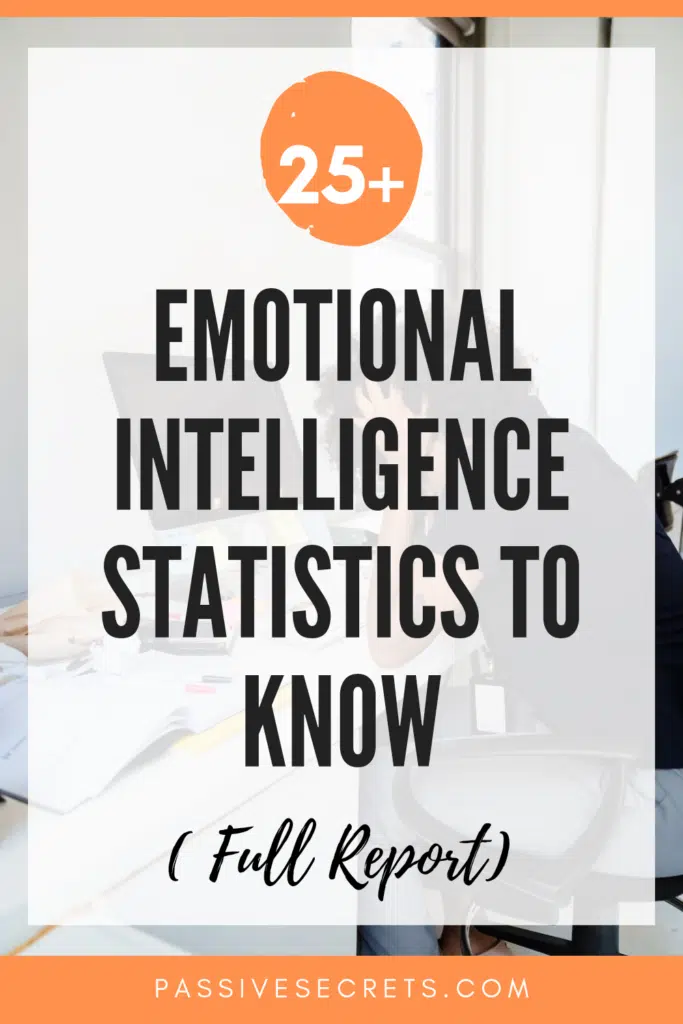
Related Posts:
- 101 Billionaire Statistics: Surprising Insights About The World’s Wealthiest
- 89 Business Loan Statistics Every Entrepreneur Should Know
- 70+ AI in Education Statistics That Prove the Future Is Already Here
- Women in Leadership Statistics: Insights into Global Gender Representation
- Soft Skills Statistics: Key Data on Demand, Training, and Impact
- 95+ Fascinating Gift Industry Statistics to Surprise and Delight
- Top Business Coaching Statistics & Trends Every Leader Should Know
- How Much Are People Saving? Key Personal Savings Statistics Explained
- 40+ Useful Procrastination Statistics To Help You
- 90 Amazing Millionaire Statistics & Facts You Dare Not Miss
- 50+ Latest Life Coaching Statistics And Huge Trends
- 30+ Useful Real Estate Photography Statistics and Trends You Need to Know
- Data-Driven Decision-Making Statistics: Trends, Benefits & Challenges
- 54 Incredible Goal-Setting Statistics To Help You
- 45+ Interesting Communication Skills Statistics & Huge Trends
- Body Language Statistics & Fun Facts To Boost Your Communication Skills
- 35 Interesting Public Speaking Fear Statistics & Fun Facts

